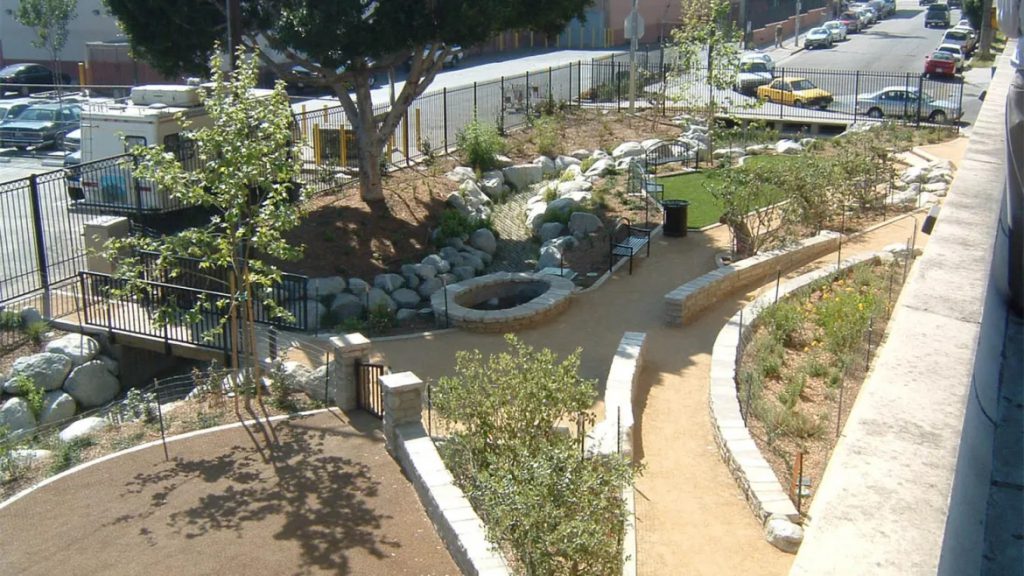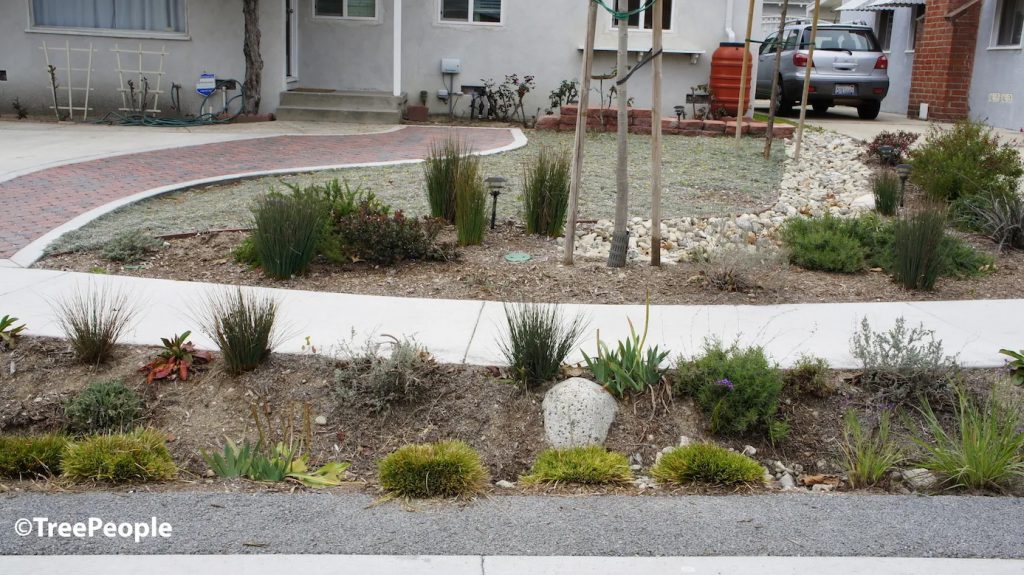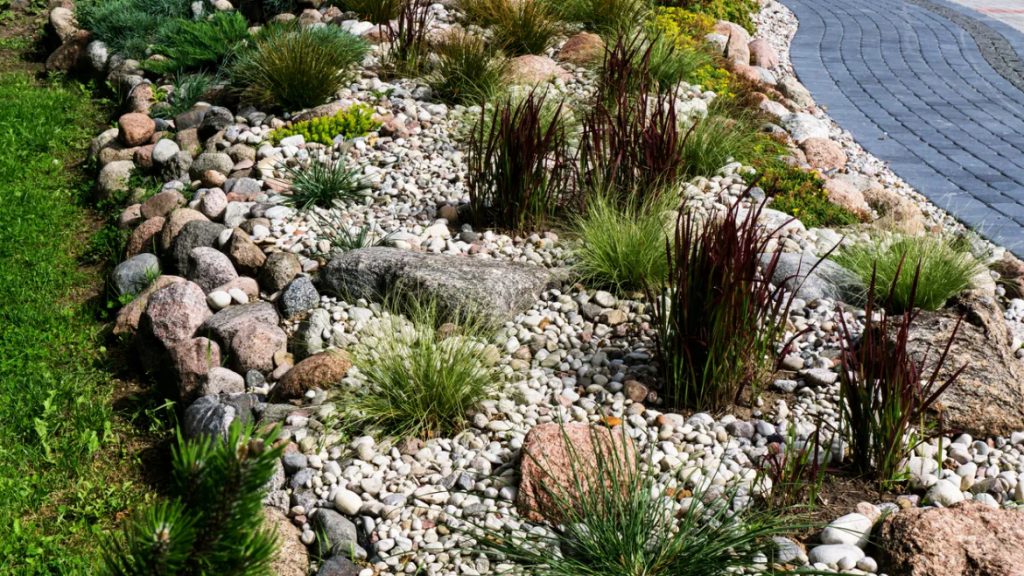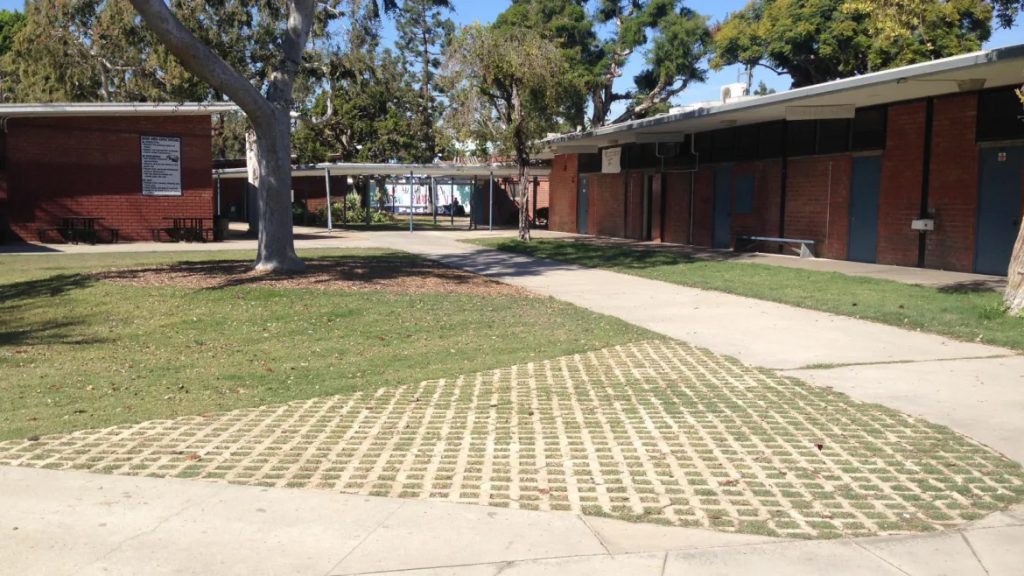
Bimini Slough Ecology Park. Photo: North East Trees
Recreational
Bimini Slough Ecology Park
Location: 184 S. Bimini Place, Los Angeles, CA 90004
The ¼ acre park will provide much needed open green space in Southeast Hollywood and provides stormwater capture opportunities. A 180 foot bio-filtration vegetated swale running across the park provides a system to capture and filter urban runoff that previously flowed untreated directly into a storm drain to the Pacific Ocean. Additionally, the park features recycled broken concrete, permeable surfaces, river rocks and boulders, and low-water using indigenous plants that help filter water-borne pollution and allows rain water to infiltrate into the ground.
To learn more about this neighborhood project, please visit: http://www.bringingnatureback.org/projects/bimini-slough-ecology-park/
Tujunga Wash Greenway Restoration Project
Location: Tujunga Wash, 13069 Victory Blvd., Los Angeles, CA 91040
The Tujunga Wash Greenway Restoration project is a one mile segment of the once-natural Tujunga Wash and includes walking paths, beautiful native landscaping, comfortable benches, interpretive displays and views of the Santa Monica Mountains. A gravity-fed pipe takes urban runoff from the flood control channel and creates a new stream with some of the natural characteristics from the Tujunga Wash, while native plants in the streambed help clean the water and establish habitat for animals such as birds, frogs and lizards.
To learn more about this neighborhood project, please visit: http://www.lamountains.com/parks.asp?parkid=671
Machado Lake
Location: Machado Lake, Los Angeles, CA 90744
The Machado Lake Ecosystem Rehabilitation and Wilmington Drain Multi-Use projects aim to improve the water quality conditions, visual aesthetics and the biological diversity of the ecosystem by integrating ecological and engineering strategies and solutions involving watershed-based management approaches. The project hopes to promote a lasting stewardship of this open space through community education programs and collaborative public and private partnerships to ensure the success of this multi-benefit project.
To learn more about this neighborhood project, please visit: http://www.lapropo.org/sitefiles/machado/executivesummary.pdf

Elmer Avenue Neighborhood. Photo: TreePeople
Residential
Elmer Avenue Neighborhood
Location: 7700 block of Elmer Avenue, Los Angeles, CA
The Elmer Avenue Neighborhood retrofit project incorporates stormwater capture technologies that provide multiple benefits on both private and public property. The homes that line the street were retrofitted with bioswales, rain barrels, drought tolerant planting palettes, and permeable pavers, while the public street incorporated under-street infiltration galleries and catch basins. Taken together, these strategies turned Elmer Avenue into a multi-benefit “green street” project that manages runoff from 40 acres of residential area. The benefits included reducing street flooding during storm events, preventing polluted runoff from reaching the LA River and eventually the ocean, enhancing the community through increased green space and improved infrastructure, recharging 16 acre-feet of groundwater each year that would otherwise go down the storm drain, and promoting awareness of water conservation and watershed connections. Phase II of the Elmer Avenue project, Elmer Avenue Paseo, converted a concrete alleyway into a bioswale that can capture stormwater runoff from an additional 20-acre upstream area and infiltrate it into the ground below. In addition to water management benefits, this project created a new walking path for the community to enhance connectivity and served as a place for community artwork involving local students.
For more information on this neighborhood project, please visit: https://www.watershedhealth.org/living-laboratories
Avalon Green Alley Network – Phase 1
Location: Between W 53rd Street and W 54th street and Main Street and San Pedro Street, Los Angeles, CA 90037
The Avalon Project will transform six alley segments that create a network and a connection between residential homes and community amenities, including the local schools, parks and local grocery store. The multi-benefit Avalon Green Alley Network spans an approximately 35-acre neighborhood and is comprised of six city blocks and alleyways.
Phase 1 includes construction of the L-shaped alley in the southwestern corner of the network, located between West 53rd Street and West 54th Street and Main Street and San Pedro Street. It involves the construction of three multi-benefit projects to capture and infiltrate runoff from the surrounding block and intersecting streets via catch basin intercepts, a dry-well system, over 2,200 square feet of interlocking permeable pavers overlying an infiltration trench and vines and fruit trees in planters.
Read more about your neighborhood project here: Avalon Green Alley Network
LA StormCatcher – Marilla Street
Location: Marilla Street, Northridge, CA 91325
This residence located on the block of Marilla Street participated in The Collaborative’s StormCatcher Project (#LAStormCatcher) which retrofitted pilot homes with large tanks (cisterns) and rain gardens to demonstrate how Angelenos can secure a climate-resilient future by capturing stormwater at home.
Although cisterns aren’t used widely locally, they are an age-old, proven tool to help combat drought globally. The StormCatcher Project features cisterns built for the 21st century, equipped with cloud-based monitoring and controls to optimize system performance in real time.
Learn more about the LA StormCatcher project here: https://www.treepeople.org/lawatercollaborative

iStock
Industrial
Gateway Business Center
Location: 6090 Irwindale Ave., Irwindale, CA 91702
Gateway Business Center is a 25-acre site home to 10 industrial buildings located in the San Gabriel Mountain Foothills. The center’s original concrete stormwater infrastructure collected rainfall from all over the site and channeled it down the drain. When Gateway Business Center was renovated, it was reimagined with the multiple possible benefits of stormwater capture in mind. The upgraded stormwater management is inspired by natural processes and captures water onsite to irrigate the native and adaptive landscaping that was planted on the site. The design includes a bioswale feature that was retrofitted from the old centralized concrete channel to detain and infiltrate rain water and rainwater harvesting tanks that collect rainwater and runoff from the building roofs to irrigate the gardens. With all the stormwater strategies combined, 80% of the rain that falls on the site is captured instead of wasted. And, employees can enjoy the newly lush native landscaping and walking trails inspired by local landscapes and the surrounding mountain environment.
To learn more about this neighborhood project, please visit: http://bit.ly/2t3CjJC
Jeff Seymour Family Center
Location: 10909 Emery St, El Monte, CA 91731
The Jeff Seymour Family Center campus design is a direct result of listening to community members and partnering with the organizations on site to develop features that are unique and meaningful to the stakeholders of the Center. The transformation of the campus was made possible with the help of community volunteers and conservation corps workers. Water is a guiding principle in the campus design. Following the flow of water on site, water-intensive grass was removed and changed the shape of the ground to add gentle depressions, mounds and swales to direct and capture rain and run off, creating a new topography and a new sense of place. Rain gardens and bioswales located throughout the campus collect and infiltrate water from rooftops, sidewalks, asphalt blacktops, and parking lots. As gravity pushes water through layers of soil, it is naturally cleaned before recharging our underground water supply. This process also helps prevent pollutants from entering our waterways. Native plants create habitat for birds and butterflies. Increased tree canopy cools surfaces, sequesters greenhouse gases, captures stormwater, improves air quality, and beautifies the campus.
Find more information on the various features of this neighborhood project here: Jeff Seymour Family Center
Chatsworth Station Parking Lot
Location: 10040 Old Depot Plaza Road, Chatsworth, CA 91311
Located at 10046 Old Depot Plaza, this Metrolink stormwater capture project was implemented to better manage stormwater runoff from a newly added section of the parking lot. A long, narrow bioswale planted with native grasses captures and filters the pollutants found in stormwater run-off. Once the water is filtered by the grasses, it percolates down and is collected in an underground storm drain. In addition to managing stormwater in a clean, sustainable process inspired by nature, the bioswale provides a beautiful green space for visual interest.
For more information on this project, please visit: ASLA.org

Edward Markham Middle School. Photo: Council for Watershed Health
Educational
Compton Creek Natural Park at George Washington Elementary School
Location: 941 W Cressey Street, Compton, CA 90222
The Compton Creek Natural Park at George Washington Elementary School changed an abandoned, muddy field into a three-acre restored park that includes a walking path, exercise equipment, and natural habitat for native plants and animals. It also includes an underground cistern with a 127,000-gallon capacity that will capture rainwater that can be used to irrigate the park. Due to flooding risks, a natural creek on the site was cemented over and turned into a storm channel years ago, which destroyed the natural habitat of the area. This project restores some of the original ecological function of the creek while providing a beautiful and educational amenity to the school and surrounding community.
For more information on your neighborhood project, please visit: http://www.cwecorp.com/pcm_projects_article_laccc.html
Edward Markham Middle School
Location: 1650 E 104th Street, Los Angeles, CA 90002
After completing a Facilities Condition Assessments for several schools and identifying high priority repair projects that were also opportunities to integrate stormwater management strategies, Los Angeles Unified School District completed improvements to the Edwin Markham Middle School campus that included stormwater management strategies. These repair projects included permeable paving, bioswales and biorention areas that will capture, clean and infiltrate stormwater runoff to keep litter and pollutants out of the Los Angeles River. Council for Watershed Health partnered with the Friends of the Los Angeles River (FoLAR) to facilitate a series of Professional Development Workshops for teachers and staff to learn about the multi-benefit water capture projects and how to incorporate them into existing curricula as outdoor living laboratories. Through these repair projects, students and teachers now have the chance to explore, learn and discover how their campus is connected to the Los Angeles River and watershed.
For more information, please visit the Council for Watershed Health
Ocean Friendly Garden – Culver City High School
Location: 4401 Elenda Street, Culver City, CA 90230
The students at Culver City High worked together with West Basin Municipal Water District and other partners to create a 2,332 square-foot garden at the Robert Frost Auditorium. Replacing a planting palette dominated by ivy, the new ocean-friendly garden uses drought-tolerant plants that demand up to 80% less water for irrigation than the original landscaping. The design features several bioswales that capture stormwater runoff from the auditorium roof, retaining and filtering the water to irrigate the plants on the site and reduce polluted runoff to the ocean.
For more information, please visit: http://www.westbasin.org/sites/default/files/press-releases/culver-city-robert-frost-ofg-april-2015_0.pdf